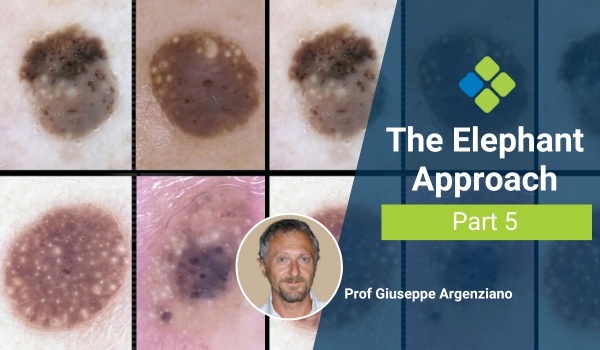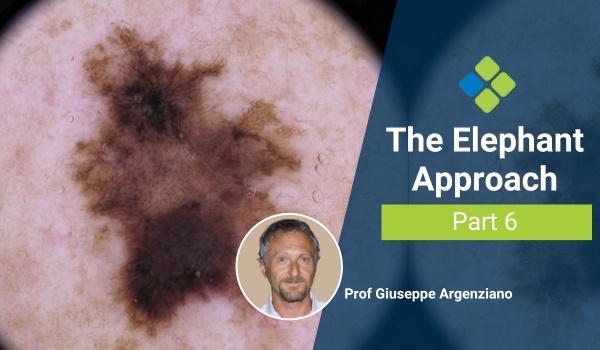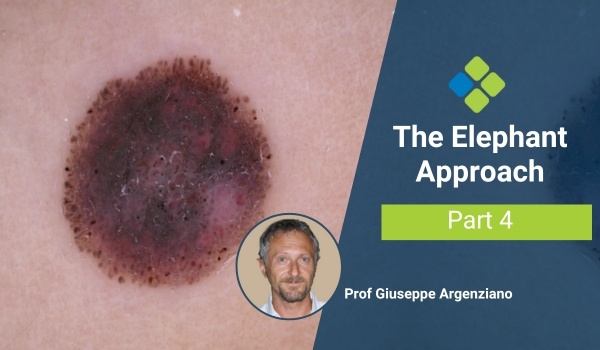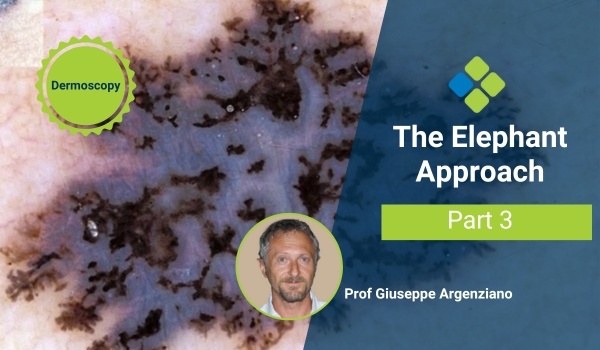The Elephant Approach (part 5)
Prof Giuseppe Argenziano explores The Elephant Approach to pattern analysis. Differentiate between commonly-confused lesions with a series of real cases.

HealthCert Education
In this month's skin cancer update video, Professor Giuseppe Argenziano continues to explore The Elephant Approach to pattern analysis, as applied to a series of real patient cases — this time comparing sets of commonly-confused lesions.
In the first part of this series, Prof Giuseppe Argenziano gave a brief history of dermoscopy algorithms and explored the foundations of pattern analysis in the diagnosis of pigmented skin lesions. Missed it? Catch up here.
In the second part, Prof Argenziano walked through the three clues to diagnose melanoma. Missed it? Catch up here.
In the third part, he returned to The Elephant Approach and ran through a series of real patient cases to test your knowledge of quick pattern analysis, asking the simple question: Good or bad? Benign or malignant? Missed it? Catch up here.
In the fourth part, Prof Argenziano continued this rapid-fire knowledge testing. He asked you to quickly examine a series of images and apply The Elephant Approach to pattern analysis to determine whether they were benign (naevus, seborrhoeic keratosis, vascular lesion, dermatofibroma) or malignant (melanoma, basal cell carcinoma). Missed it? Catch up here.
In this fifth instalment, Prof Argenziano asks you to use The Elephant Approach to quickly differentiate between sets of commonly-confused skin lesions, including:
- Seborrhoeic keratosis vs basal cell carcinoma
- Basal cell carcinoma vs melanoma
- Vascular lesions vs dermatofibroma
He asks you to apply your knowledge of pattern analysis to quickly differentiate between various potential diagnoses.
See all this and more in the full video below, and keep an eye out for the last instalment in the series (coming next month).
Watch the full video now:
|
Engaging with this blog can help meet your annual |
|
How to claim your CPD hours If you consume educational webinars, podcasts, articles, or research on this blog, you can Quick Log CPD hours with the RACGP via the usual self-submission process. You will be asked to reflect on what you have learned, and you will require supporting evidence such as a screenshot. Download the RACGP’s guide to self-recording your CPD here. |
Prof Giuseppe Argenziano is Professor and Head of the Dermatology Unit at the University of Campania, Naples, Italy; Co-founder and past president of the International Dermoscopy Society; and Editor-in-Chief of Dermatology Practical and Conceptual Journal. His main research field is dermato-oncology, authoring numerous scientific articles and books concerning dermoscopy, melanoma and non-melanoma skin cancer. As coordinator of the Melanoma Unit at the Campania University, he has established a successful tertiary, multidisciplinary, referral center particularly devoted to the diagnosis and management of patients with melanoma and non-melanoma skin cancer.
Over the past 25 years, Prof Argenziano has supervised over 500 foreign and Italian residents in dermatology, established scientific collaborations with 1500+ colleagues from more than 50 nations, and organised more than 500 national and international didactic meetings, courses and conferences (such as the Consensus Net Meeting on Dermoscopy and the First Congress of the International Dermoscopy Society).
Prof Argenziano has authored more than 650 full scientific articles and produced landmark primary publications and books in the field of melanoma and dermoscopy. Over the past 25 years he has been invited as speaker and/or chairman in more than 500 national and international conferences in the field of dermatology. His combined publications have received a sum total of 15.250+ citations with an h-index value of 61 (Scopus 2020).

 1800 867 1390
1800 867 1390







